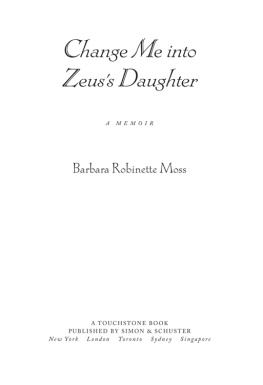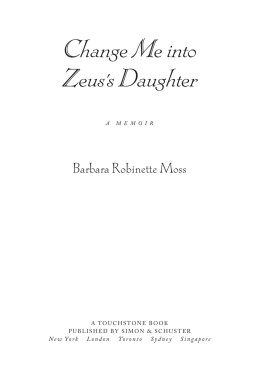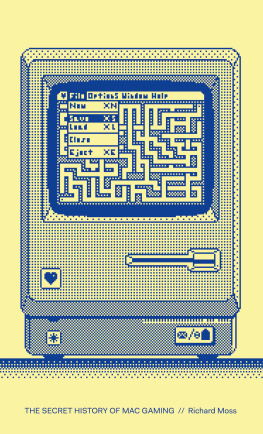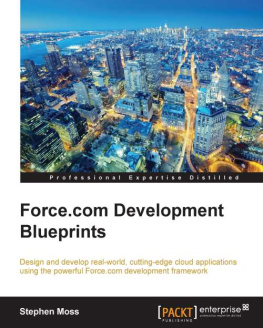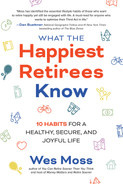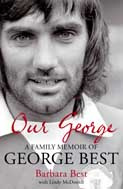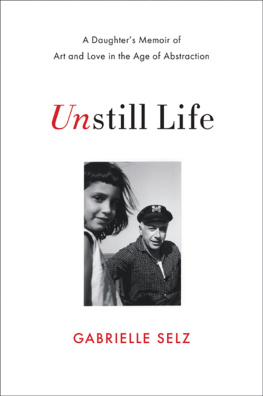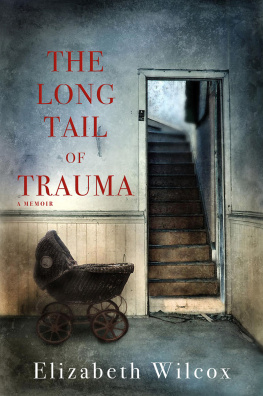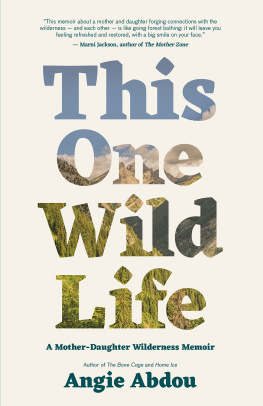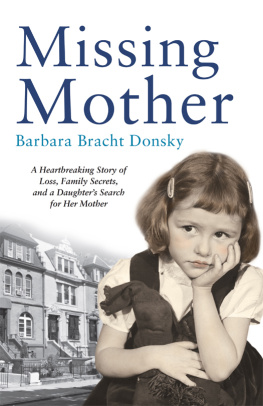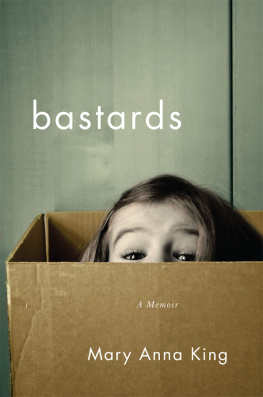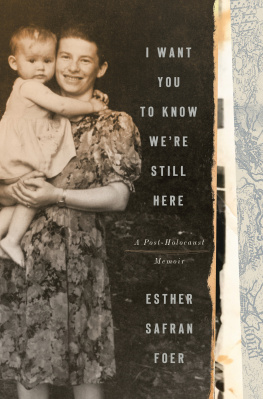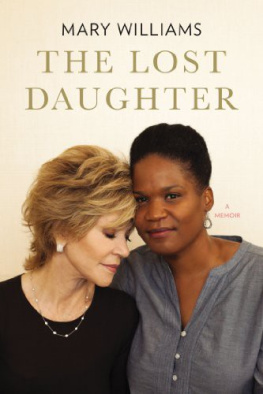Acknowledgments
My intention in writing this book was to go back in timeto heal old wounds and reclaim my family. Too fearful to take on such an adventure alone, I took my friends and loved ones with me.
My kindred spirit and husband, Duane DeRaad, listened to my stories and encouraged me to write them. My son, Jason Freeman, from an early age listened to those same stories with interest and without judgment.
One of my graduate professors said I led a charmed life. I didnt know what that meant until I met M. T. Caen, who became my agentand almost immediately, I was taken under the wings of Susan Moldow, Nan Graham and Sarah McGrath at Scribner. I am astoundedand forever grateful. Mary Swander taught me how to structure a story, and how to be patient. Kate Kasten and Tania Pryputniewicz read acutely, gave indispensable guidance, and made it enjoyable. Ann Wright Au, Ingrid Mazie and Melanie Parks soothed the hurt and reminded me that there is good living to be done. Karman Hotchkiss tenderly edited the first draft.
I am grateful for the support received from Jonis Agee, Michael Carey, Jack Davis, Adrienne Drapkin, Jim Harris, Susan Kratz, Charlie Langton, Shannon Miles, Robert Neymeyer, Joni Russ, Sharon-Ord Warner and Richard Webster.
My aunt, Janet Robinette Smith, rescued me as a child, told me stories about my parents I had never heard before, and encouraged me to publish this book. I am thankful for the telling and re-telling of family stories by my parents, Stewart Karl Moss, Sr., and Doris Robinette Moss, and my siblings, Alice, Stewart, David, Willie, Doris Ann, John and Janet.
The author would like to thank Diane Wakoski for the use of her poem I Have Had to Learn to Live With My Face, from Emerald Ice, Black Sparrow Press.
Birth Order:
Alice Jane
Stewart Karl, Jr.
David James
Barbara Allen
William Riley
Doris Ann
John Patrick
Mary Louise
Janet Lynn
Near the Center of the Earth
M other spooned the poisoned corn and beans into her mouth, ravenously, eyes closed, hands shaking. We, her seven children, sat around the table watching her for signs of death, our eyes leaving her only long enough to glance at the clock to see how far the hands had moved. Would she turn blue, like my oldest sister, Alice, said? Alice sat hunched next to me in the same white kitchen chair, our identical homemade cotton dresses blending into one. She shoved my shoulder with hers as if I were disturbing her concentration and stared unblinking at Mother. Each time Mother hesitated, spoon in mid-air, Alices face clouded and she pushed against my shoulder.
Shes dying, Alice whispered, covering her mouth so Mother could not hear her. I told you she was gonna die.
I ignored her and watched Mother. I wanted to feel the kernels of sweet yellow corn slide against my teeth. I didnt care if they were poisoned. I was so hungry my head throbbed. The clock ticked as loudly as the clattering train that passed beside our house every day, each tick echoing against the wall and bouncing into my head, making my heart beat in my temples and my eyes want to close. I forced my eyes to stay open, to watch my mother as she ate. I stared at her; the light freckles on her face smeared into a large round blur, then snapped back into focus. No one spoke or moved. My oldest brother, Stewart, sat next to me, hands in his lap clenched into tight white balls; David, his chair pushed as close to Stewarts as possible, leaned forward with his arms spread across the table, ready to catch Mother if she fell. Willie and Doris Ann also sat together, their small legs sticking straight out, dirty bare feet dangling over the edge of the chair seat, Doris Anns arms wrapped around the feather pillow from her bed. Mother held John cuddled in her lap, leaning over his head to spoon the beans into her mouth. He fussed and reached for the spoon, hungry and angry because she kept pushing his hand away.
Mother had waited all morning for a letter from Dad, a letter with money for food. When, once again, no letter or money arrived, she went out to the toolshed and brought in the corn and bean seeds for next years garden. The seeds had been coated with pesticides to keep bugs from eating them during the winter. Poison. I watched Mother split the dusty sealed brown bags with a kitchen knife and empty the contents into bowls, the seeds making sweet music as they tapped the glass: ting, ting, ting. She ran her hands through the dry seeds, lifting them to her nose. Did they smell like poison? She rubbed a fat white bean between her fingers and touched her fingers to her tongue, then spit into the sink, rinsed her mouth with cold water and spit into the sink again. She stood staring out the window above the sink, her hands limp in the bowl of seeds. She stood this way for ten minutes or more, staring out the window.
Then, as if released from a spell, she opened the cabinet and got out two colanders. She poured the dry seeds into them: corn in one, beans in the other, and ran water over and over them. She rubbed each tiny seed with her fingers and wiped the cool water on her forehead and the back of her neck. Her dress was already damp under the sleeves from the afternoon heat.
Those seeds are poison, you know. Poison. If we eat them, well die, Alice whispered. She was eleven and knew these things. I tapped my bare feet against the kitchen chair and thought about this, deciding I would eat them anyway. I was so hungry and certain that no poison could kill me. I could just tell myself not to die and I wouldnt. I was that strong.
John slid from his chair and pulled at Mothers dress, kicking and fussing, wanting to be held, wanting to be fed.
Alice, why dont you take the kids outside for a little while, Mother said as she churned the seeds through the water. She turned and caught Alices disappointed face. Just for a little while, she said.
We stumbled reluctantly out the back door. Alice peeled John from Mothers legs and carried him out; he liked to be outdoors and stopped fussing. We moved into the yard, each claiming our territory. Stewart and David ran into the garden and picked cornstalks, to joust like the knights in our storybooks. Alice took John for a walk in the shade of the oak trees, to push the leaves around and look for buckeyes. She began reciting from her favorite book Alices Adventures in Wonderland the part where the Mad Hatter sings Alice an example of what he sang for the Queen of Hearts: Twinkle, twinkle, little bat! How I wonder what youre at! Up above the world you fly, Like a tea-tray in the sky. I sat on the steps with Willie and Doris Ann and listened. When she couldnt remember any more, she jumped to her favorite parts of The Walrus and the Carpenter.
The Walrus and the Carpenter were walking close at hand. They wept like anything to see such quantities of sand. If this were only cleared away, they said, it would be grand! If seven maids with seven mops swept it for half a year. Do you suppose, the Walrus said, that they could get it clear?
Pale mountains jutted in the far distance. I could see the gas station at the bottom of the hill and farther on, barely visible, our closest neighbors house. Directly in front of me was the garden, or what was supposed to be a garden. The fierce sun had baked it brown before any vegetables had appeared, the temperature climbing to over a hundred degrees every day. Twelve rows of shriveled corn, dwarfed and fruitless. So many tomato plants, twenty or more, the little yellow flowers dried and stiff, not bothering to form into green balls. The tomato vines weaved in with the cucumber vines like the hot-pan holders we made on our loom. Grasshoppers, thriving in the heat, had stripped the cucumber plants. Vines, like curved barbwire, ran through the dusty red clay, in and out of the tomato vines and in and out of the bean rows.

